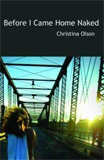Review by Karen J. Weyant
Spire Press
ISBN 978-1-934828-09-0
2010, 80 pp., $14.00
www.amazon.com
In a world where writers complain that people just don’t read poetry, the title of Christina Olson’s first full length collection of poetry, Before I Came Home Naked will certainly catch a reader’s eye. But it’s not the title that is superb about this collection: it’s the rich narratives that follow a narrator’s journeys and exploration for what it means to call a place home.
Olson’s collection is a travel book of sorts. Still, a reader should not venture through the pages expecting the typical “travel” poems. Instead, we experience meeting past hurricanes in “At the Hurricane Name Retirement Center.” Or, we get to visit Bigfoot in Texas in the poem “The Woolly Booger” through the lines “Because down there/everything’s bigger/and a guy can keep/himself to himself.” Finally, there’s even a visit to a ball of string in “Poem Written After an Hour Long Road Trip to Darwin, Minnesota, Home of the World’s Largest Ball of Twine Rolled by One Man.” Through these journeys, we see both humor and bewilderment, and sometimes even a bit of sadness, as found with this last poem when the narrator notes, “If I lived here I would free the world’s/largest ball of twine on a moonless night, cold//still air sitting sweetly in lungs, only sound/locomotives moaning eastbound to Dassel.”
Even more ordinary places get the star treatment. For instance, we find the narrator in the poem, “Buffalo: One Thousand Feet” where she observes, “If we’re going to lose//an engine, better do it right now/Let me fall from this altitude, let me/tumble towards gray so deep I can’t/tell city street from cloud, from lake.” In the poem, “Pompton Lake” the narrator explains that “When you are young even Jersey//can be fun” while offering a litany of memories (imagined or otherwise) of a rented home where “Jeff and I/like some things: the shaggy red stairs/the concrete gnome out front with house numbers/bolted to his belly.” Whether her journeys explore the exotic or more commonplace, the poet sums up her travels in “Ars Poetica” a poem that clearly anchors, and perhaps even explains the collection’s focus on travel:
Certainly I love places:
that last quarter
mile of Vermont gravel
that brought meHome that summer;
all those jogged laps
over for another day. Or
the stark redness of silopunctuating the Ohio
horizons. New York only
sleeps two hours a night –
early morning, honestly —and when insomnia throttled
men in its scaled hand
I’d walk away five
to seven on the street:everyone I passed was me:
their pacing, our shared
want for cigarettes,
coffee bean, sleep, eyecontact.
In between travel poems, we see snippets of everyday life. Some of the poems take the form of what might be perceived as simple (yet poetic) musings. For example, in “I Keep Goldfish” the poet smugly opens her poem with “because the lease says in its first clause/no pets” and “because/their bodies flush without pomp or plumbing/problems.” Light hearted yearnings turn darker to the end when the narrator explains her true admiration for this pet: “Because they’re the unsung/martyrs of long ago hazings. Because I envy anything//with a three second memory, because they can’t blink/and I look away first.”
Certainly, the poet also makes use of memory as part of her muse. In “After Learning that the Family Dog has Been Put Down” the narrator grapples with loss and grief. In “Family Recipe” the narrator bonds with her father over food. And in “Poem I Would Rather Your Mother Not Read” the narrator retells the story of a past relationship. Whether there’s humor or heartache, Olson presents each story, each memory, each feeling with an honesty that is often camouflaged in much of today’s written work.
Olson’s collection leaves the reader in a whirlwind. Out of breath, we reach the final pages only wanting more of a narrator who is a little lost and a little out of control, but always determined (and maybe, just maybe, a little stubborn). In Olson’s words, every place is worth celebrating, every journey a wonderful exploration. Certainly, with this fine first collection, Christina Olson is a poet to watch.
Comments are closed.